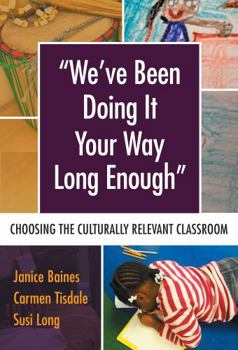We've Been Doing It Your Way Long Enough: Choosing the Culturally Relevant Classroom
(Part of the Language and Literacy Series and Language and Literacy Series)
Select Format
Select Condition 
Book Overview
Filled with day-to-day literacy practices, this book will help elementary school teachers understand their role in dismantling the imbalance of privilege in literacy education. Chapters take readers into classrooms where they will see, hear, and feel decolonizing and humanizing culturally relevant pedagogies as students learn literacy and a critical stance through musical literacies, oral histories, heritage lessons, and building a critical consciousness. The authors also share strategies to help teachers examine their own educational spaces, start the school year in culturally relevant ways, build reciprocal relationships with families and communities, and teach within standards and testing mandates while challenging unjust systems. Practices are brought to life through students, families, and community members who voice the realities of pedagogical privilege and oppression and urge educators to take action for change.
Book Features:
Classroom practices that build literacy proficiency and a critical consciousness while re-centering omitted, distorted, and marginalized histories and heritage. A strong foundation and rationale for why decolonizing and humanizing culturally relevant pedagogies are necessary. Strategies to help teachers and schools engage in self-examination and take action for change. Strategies for nurturing mutually respectful relationships with families and community members as teachers affirm and learn from their wisdom. Culturally relevant teaching grounded in the ethics of African cultural practice with an emphasis on its value for every student. Lists of children's books, professional books, and websites to support the practices described throughout the book.




